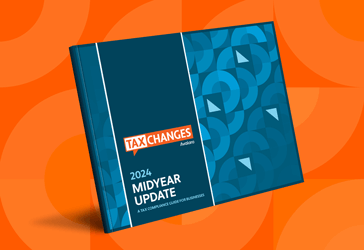The Hairy Truth about How States Tax Services - Will's Whiteboard
Once upon a time states tended to tax goods and not services. Those days are rapidly disappearing. Watch this video to learn three key questions that will help you handle state taxes on your own services, from accounting and payroll services to media services and beyond.
Transcript
Hi. Welcome to Will’s Whiteboard. I’m Will. Recently, there was a lawsuit filed against a major pizza chain in Illinois and Florida, and the claim was they were incorrectly charging sales tax to their customers. But it wasn’t the sales tax on the pizza that was in question – the actual good of the sale – it was the sales tax on the service of pizza delivery that was in question. It turns out, this was a big deal for the company. They estimated that in Florida alone, the alleged incorrectly charged sales tax amounted to roughly $5 million. And I tell you the story because sales tax on services can be a hairy problem for businesses to solve.
Over the last few decades, more and more states are legislating that businesses should charge sales tax on more and more services. So to help you wrap your mind around what your sales tax obligations might be for the services you provide, I’ve got three questions for you to ask.
Question number one, plain and simple, “Is it taxable?” This will depend on the location. Let’s take repair services. In Connecticut, repair services are generally taxable unless they’re done to a residential property. In Louisiana, on the other hand, they handle repair service taxability differently. They say repair services are taxable when it’s to movable property, but when it’s done to immovable property like tracks of land, it’s not taxable.
Second question to ask, “What is the true object of the sale? Is it a good or is it a service?” This comes into play when you’re selling both together. An example from California, which by the way doesn’t tax nearly as many services as Connecticut, they get the example of a company that offers accounting and payroll services to its clients. Along with those services, the company sometimes provides physical objects like binders and forms. However, in the eyes of the State, the true object of the sale is the service and not these physical objects. Therefore, their company shouldn’t charge its clients sales tax on those physical objects. On the other hand, California offers a counter example of a company that offers drafting services for clients – drawing blueprints. In California’s eyes, the drawings themselves are the true object of the sale and not the service of drawing. Therefore, those drawings are taxable.
The third questions to ask here is, “What type of thing are you selling? Is it a good or is it a service?” It may seem like an elementary question, but if you’re used to selling one over the other, when you switch, you could get caught up in unfamiliar territory. Let’s take an example from Maine. Businesses that sell hairstyling and barbering services, when they also sell products like shampoo that customers take home and use there, those things should be taxed at the time of sale. On the other hand, the services themselves – the hairstyling, the barbering, the shaving – those are not taxable in the state of Maine.
As you can see, sales tax on services can be a real rat’s nest. However, I hope these three questions give you a starting point from which you can better understand how your services might be taxed. Thanks very much. I’ll see you next time.
Stay up to date
Sign up for our free newsletter and stay up to date with the latest tax news.













